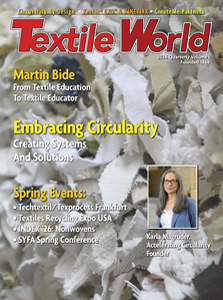Among its ever-growing readership, the Rupp Report enjoys a lively e-mail exchange with dedicated
readers, which is always more than welcome. In the past weeks, I’ve had a vivid communication with
some readers who have asked: “Are you on the green trip now?” because
Textile World
has published some reports with green or environmental content. No, I’m not, I replied. There
are hundreds of reasons today to be conscious of the environment, and it pays off.
Ecology is not a simple marketing phrase or a public relations tool. Austria-based Lenzing
AG, a leader in global viscose production, is heavily committed to an environmentally friendly
production and attitude in its business. In 2008, the group recorded sales of 1.33 billion euros,
with an export share of 88 percent. The annual fiber production was 540,300 metric tons with a
staff of 5,945 people.
Global Collapse Of The Fiber Market …
The global collapse of the fiber market at the end of 2008 was followed by a second-quarter
2009 minor recovery, which continued into the third quarter. The cotton price of 60 cents per pound
at the end of the third quarter was still far below the 2008 peak price of more than 80 cents. The
situation for polyester prices was similar; they increased slightly due to rising crude oil prices.
In July 2009, the Lenzing Group acquired 40 percent of Indonesia-based fiber trading company PGL,
which has been in cooperation with Lenzing’s Indonesian subsidiary PT. South Pacific Viscose (SPV)
for many years. As PGL itself holds a 12-percent share in SPV, Lenzing thereby raised its share in
SPV from 86 percent to about 91 percent.
… Followed By Rising Demand For Cellulose Fibers
According to recent information, Lenzing is enjoying a rising demand for cellulose fibers.
Positive second-quarter developments continued into the third quarter, due to this rising demand,
the company said. However, the global economic crisis had a considerable impact on the company’s
first-quarter results and affected sales and figures. Consolidated sales in the first nine months
of 2009 fell to 912.3 million euros, compared with 1,012.1 million euros in the same period in
2008. On the other hand, the nine-month financial result improved by 44 percent to -10.4 million
euros, compared with -8.4 million euros in the first nine months of 2009, owing to a positive
foreign currency result.
Textile And Nonwoven Fibers
By the end of second-quarter 2009, Lenzing’s fiber production approached full capacity at all
locations. At the same time, inventories were significantly reduced due to rising demand, and the
market accepted the first price increases. Pulp prices recovered, making it necessary to further
adjust prices. Viscose fiber prices are still considerably lower than last year’s price levels.
Beginning with the second quarter, the Textile Fibers business unit again realized very good sales
results for both standard fibers and special fibers, including Lenzing Modal®, Lenzing FR® and
Tencel®. Lenzing also noted very strong regional demand in Asia and Brazil.
The Nonwoven Fibers business unit recorded significantly increased demand for cellulose
nonwovens products and a slight increase in fiber prices. New situations, such as the fear of a new
influenza epidemic, caused demand to rise for hygienic wipes and medical face masks. Disposable
products, such as baby wipes, were very successful in the United States “due to the natural origin
of the fibers”, the producer claims.
A Look Into The Crystal Ball
Lenzing is “cautiously positive” about its business development for the rest of 2009, noting
“better than expected” development of the fiber market over the past year. The company anticipates
trends in Asia, Turkey and South America may remain positive, but it is still possible inventories
may build up in the textile supply chain, and forecasts beyond the end of 2009 are tentative. In
addition, Lenzing expects anti-dumping procedures in Brazil and India will significantly slow sales
of products that contain its fibers.
Imitators Welcome
A few weeks ago, the Rupp Report informed its readers with the latest news from the fiber
front, quoting that Lenzing is heavily dedicated to environmentally friendly production
(See
The
Rupp Report: The U-Turn Of The Man-Made Fiber Industry, Sept. 22, 2009). Lenzing board
member Friedrich Weninger mentioned that any fiber production should be environmentally friendly
and that “responsibility has to become the key issue of economic, social and environmental
activities.” This seems to pay off, at least for the Austrians. Here, imitators following an
ecological and economical way are more than welcome.
November 10, 2009




